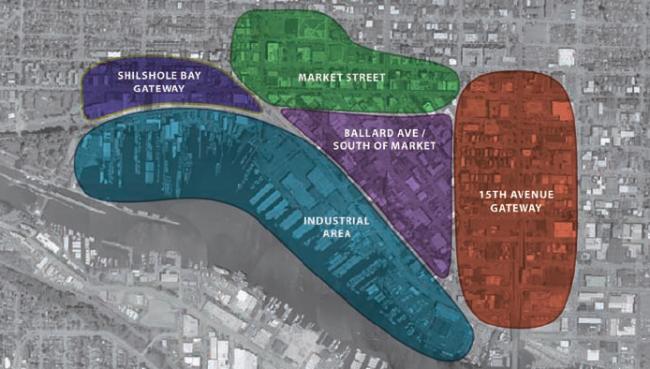Ballard Chamber presents its vision of the Ballard business district, examines forming a Businesses Improvement Area
This map illustratesthe complex Ballard business district. The five activity
clusters outline the business and industy mix around central Ballard.
Thu, 02/09/2012
By Ian Tyson and Anne-Marije Rook
In its annual meeting, the Ballard Chamber of Commerce announced Seafood Fest 2012 is on, and discussed its vision for the future of the neighborhood’s business district.
'We are currently investigating efficiencies and partnerships that would lessen the workload of SeafoodFest for our organization, particularly its staff. In doing so, we also are being very careful to maintain the community nature and flavor of the festival. SeafoodFest will continue to be a reflection of Ballard and its heritage," said Beth Miller, the Chamber's Executive Director.
Though some smaller chamber-sponsored community events may be cancelled over funding concerns, more money will be spent creating a stronger marketing presence for the neighborhood.
"We are in the middle of our visioning process," said Chamber president Michelle Rosenthal. "We are trying to figure out who we are, what our role is, and what people want."
As part of its move to further market and improve Ballard, the Ballard Chamber of Commerce is examining forming a Businesses Improvement Area (BIA) with the guidance and funds of the City of Seattle. Chamber Co-President Scott Ingham called the city’s BIA charter system “equitable and reliable,” and hailed the potential benefits to the neighborhood and its business community.
A BIA exists to provide additional services for an area, and is funded through a tax levied by the city on all businesses falling within chartered boundaries. Funds are then managed and spent by an Advisory Board, composed of local businesses and property owners, with the city overseeing complaints.
Tax rates are determined by a formula set by the City of Seattle, accounting for square footage and total revenues. The BIA’s charter may permanently exempt charitable organizations, and may exempt temporary stores or new businesses for up to a year. All businesses outside of these specific exemptions (if adopted) would be taxed. A tax may also be levied on the property owners of empty storefronts. The Advisory Board may raise more funds via short-term loans from the city.
Common uses include creating parking, neighborhood cleanup and beautification, special event planning, and marketing the neighborhood. The University District BIA, among other neighborhoods nationally, have also used the funds to hire additional security for the neighborhood to help police areas near bars on weekends. Other Seattle neighborhoods with active BIAs include the West Seattle Junction, the International District, Broadway, and Pioneer Square.
To gain City Council approval, a petition must be distributed to all potential rate-payers, and signed by businesses representing at least 60% of the assessed value of the BIA’s businesses.
"The City has notified me that we will be given consulting assistance for the exploration process of a Ballard BIA," Miller said, stressing that this is only an exploration at this time.
The Ballard Chamber of Commerce is just beginning to create the charter and associated petition, and wants community input.
"The Chamber has plans to do continued outreach to the business community in particular, as well as the community at large. Improving membership is also one of our goals for 2012," Miller said. "Overall, the Chamber looks forward to more overall engagement in 2012. With the new challenges that come from growth and change, the community needs even greater involvement and participation."
Comments can be send to beth@ballardchamber.com or visit their website at http://ballardchamber.com/ for more information.


